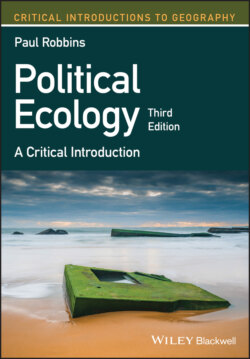Читать книгу Political Ecology - Paul Robbins - Страница 20
Common assumptions and modes of explanation
ОглавлениеFollowing Bryant and Bailey, political ecological accounts and research efforts also share a common premise, that environmental change and ecological conditions are the product of political process. This includes three fundamental and linked assumptions in approaching any research problem. Political ecologists: “accept the idea that costs and benefits associated with environmental change are for the most part distributed among actors unequally … [which inevitably] reinforces or reduces existing social and economic inequalities … [which holds] political implications in terms of the altered power of actors in relation to other actors” (Bryant and Bailey 1997, pp. 28–29).
Research tends to reveal winners and losers, hidden costs, and the differential power that produces social and environmental outcomes. As a result, political ecological research proceeds from central questions, such as: What causes regional forest loss? Who benefits from wildlife conservation efforts and who loses? What political movements have grown from local land use transitions?
In answering, political ecologists follow a mode of explanation that evaluates the influence of variables acting at a number of scales, each nested within another, with local decisions influenced by regional polices, which are in turn directed by global politics and economics. Research pursues decisions at many levels, from the very local, where individual land managers make complex decisions about cutting trees, plowing fields, buying pesticides, and hiring labor, to the international, where multilateral lending agencies shift their multi‐billion‐dollar priorities from building dams to planting trees or farming fish. Such explanation also tends to be highly (sometimes recklessly) integrative. And as we shall see, a group of people and institutions has emerged around such integrative transgressions, a global assemblage of diverse practitioners who make certain kinds of movies, write certain kinds of books, and advance certain kinds of arguments.
So, rather than adding yet another definition to a crowded field, it is best to suggest at the outset that political ecology is a term that describes a community of practice united around a certain kind of text. The nature of this community and the quality of these texts, as well as the theory and empirical research that underpins them, are the topics of the remainder of this book. But broadly they can be understood to address the condition and change of social/environmental systems, with explicit consideration of relations of power. Political ecology, moreover, explores these social and environmental changes with an understanding that there are better, less coercive, less exploitative, and more sustainable ways of doing things. Finally, it is a field that stresses not only that ecological systems are political, but also that our very ideas about them are further delimited and directed through political and economic processes. As a result, political ecology presents a Jekyll and Hyde persona, attempting to do two things at once: critically explaining what is wrong with dominant accounts of environmental change, while at the same time exploring alternatives, adaptations, and creative human action in the face of mismanagement and exploitation, offering both a “hatchet” to take apart flawed, dangerous, and politically problematic accounts, and a “seed,” to grow into new socio‐ecologies (see Chapter 4).
